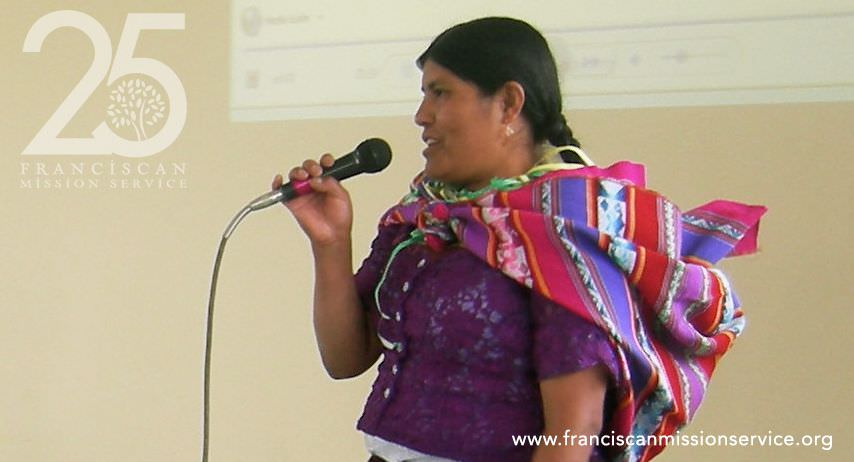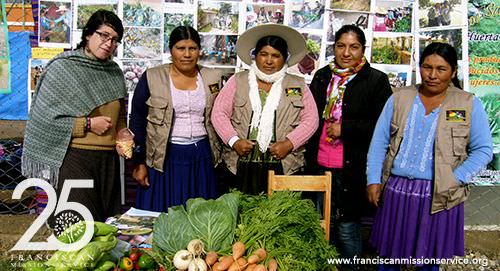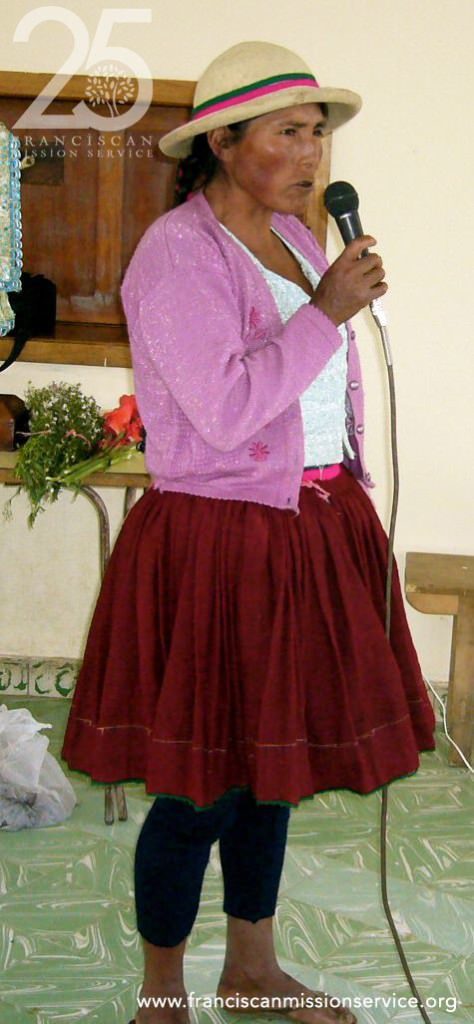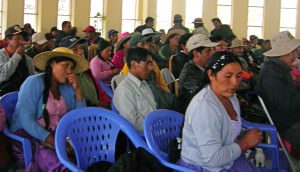Handing Over the Microphone

“Les invitamos a escuchar a nuestras hermanas. Abrimos este espacio para que ellas puedan compartir sus experiencias. Ahora este espacio es para ellas.”
“We invite you all to listen to our sisters. We open this space so that they can share their experiences with you. Now this space is for them.”
I was holding the microphone saying those words in front of a room of mostly men in a national workshop in La Paz, Bolivia on the role of women in agriculture and care for Mother Earth.
It was the third and final day of the workshop and the women participants were fed up. They had been disappointed since day one. They expected the majority of participants to be women.
The majority were men.
They expected to hear from their sisters and exchange experiences with them. And for three days, the generalized woman’s experience was presented as the exception not the focus.
They listened for hours to men talk and share their experiences. They wondered when they as women would be invited into the discussion. And they listened as the men explained to one another that the women were just too timid to participate.
How wrong that explanation proved to be.
I had the privilege to share a dormitory with 15 other women during the workshop. There were women from Santa Rosa (the community outside of Cochabamba where we work with our family garden project), and there were women from various other regions of Bolivia: Sucre, Norte Potosi, and La Paz, to name a few. There was a beautiful mix of traditional dress and native languages spoken in that one room.
On the eve of the final day of the workshop, as we all lay in our beds with the lights already turned off to go to bed, the women began to open up with one another about their experiences during the workshop.
All of the women in that room came together on one common experience, having felt marginalized in a space where they had expected to be included.
The next morning, the final day of the workshop, my boss and I, with the support of the women we work with, approached the only female organizer of the workshop and recounted to her the conversation we had had in the dormitory the previous night.
We brainstormed together about how to respond.
She decided to elect me as the moderator of the workshop for the day, a rotating position shared amongst the workshop participants. I was nervous and unsure I was fit for it.
But with the support of my boss, we decided it was worth it.We agreed to collaborate, I would moderate and she would encourage the women of Santa Rosa to speak and eventually herself speak about her experience. We realized that we could use the power of being the moderator to open up a space for the experiences of these women to be heard.
We coordinated with one of the women from Santa Rosa to be the first to speak. After asking the men in the room for their attention and respect for the women, I handed her the microphone.
She stood up and passionately, if not also nervously, addressed the room in her native language of Quechua. She explained how hurtful it was to be invited to a workshop for women and be outnumbered by men.
She expressed how disappointed she was by the participation of her sisters, whom she knew had so much to share, but weren’t given the space to do it. She cried as she connected the lack of participation of women in the workshop to the marginalization and abuse of women in society as a whole.
And she inspired the rest of the women in the room to stand up and share their experiences as well.
For the next hour, it was my role to guard the mic, to make sure that the mic was passed to each woman who wanted to speak.
This meant taking the mic back from a one man and repeatedly calming the anxious insistence from many men who approached me to suggest that we cut the women off, clearly made uncomfortable by the change of power dynamics in the room.
But the women persisted.
One by one, they spoke about their experiences caring for the Earth and for their families. They spoke about their spiritual connection with the land and sang songs in their native languages about that connection.
They challenged their fellow sisters to unite and care for one another instead of criticizing and marginalizing one another, like so many men already had.
They did not hesitate to take the microphone when it was made available to them.
And as a Franciscan lay missioner, it was clear to me that I was not called to be the “voice for the voiceless.” It was not my role to speak on behalf of these women who had been marginalized. Their experiences were not my own experiences.
If I had spoken for them instead of passing them the microphone, I would have joined the many who had silenced them instead of listening to them.
Instead, we joined together in opening a space for their experiences to be heard, their joy, their suffering and their wisdom to be honored.
Tagged in:



